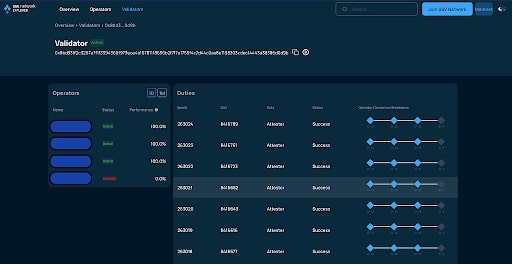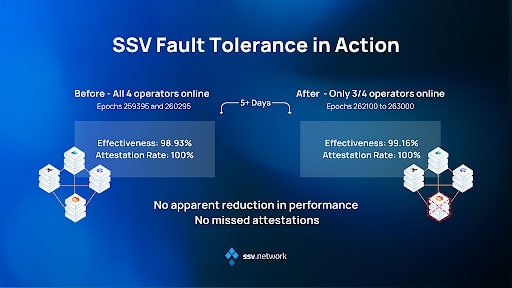Table of Contents
The platform kept the validator online and running with only three active node operators in extended node operator downtime.
In a case study released last Tuesday, SSV Network, a decentralized staking infrastructure for the Ethereum blockchain, showcased its resilience as one of four node operators experienced extensive downtime. From epoch 261395 to 263000, one of four node operators in a ‘cluster’ faced downtime, but the validator continued operating normally.
The SSV Network provides a network for distributed Ethereum validator operations. The node operators run validators in a decentralized manner and are hence rewarded with ETH incentives. To ensure the security and decentralized structure of validators, SSV NMetwork introduced fault tolerance via its Distributed Validator Technology (DVT), which kept the validator online.
SSV Network’s node operator goes offline
In the first week of February, one node operator in a cluster of four SSV Network node operators experienced extended downtime leaving three node operators active. Normally, this could be detrimental to the validator as they cannot process and attest new blocks onto Ethereum’s network. As per the study, the offline node operator (shown below) would be a factor that can lead to penalties and loss of ETH rewards for the validator.

An Ethereum blockchain node operator goes offline (Image: SSV Network explorer)
The node operator went offline from epoch 261395 till 263000 (~ 5 hours), but the remaining three node operators in the cluster continued operating the validator. By leveraging DVT, SSV Network was able to keep the validator online and perform optimally with only three of the four node operators online. DVT infrastructure addresses challenges in standard validator setups by enhancing tolerance to faulty, malicious, or under-maintenance nodes.
Employing the DVT solution enabled stakers through the validator to continue securing Ethereum, without losing their ETH rewards or facing penalties. Additionally, SSV Network’s DVT solution provides Ethereum validators with enhanced security and resilience, dramatically improving the fault tolerance of these validators.
How the SSV Network DVT solution secured validators
As alluded to, the failure of one node operator did not impact the validator. This is mainly attributed to the DVT solution which is an approach to validator security that spreads out key management and signing responsibilities across multiple parties. The solution includes clusters of 3n+1 node operators, which means for every three online nodes, one can be offline and the validator will still run.
Keyshares aim to enhance security in a cluster by distributing portions of the encrypted private key to each operator. When the Beacon chain assigns a task, each operator signs it with their assigned key share, and these individual signatures are amalgamated to reconstruct the complete signature for the validator. This means no single operator can independently recreate the entire key, securing the system against potential security breaches and malicious actors.

SSV Network leverages DVT technology to secure validators (Image: SSV Network)
The significance of DVT was apparent in the latest case, allowing the validators on SSV Network to continue to perform their duties seamlessly with the remaining three node operators.
The latest validator failure prevention opens an evolving world in ETH staking, showing the power of SSV Network in validation in lieu of promoting the safety and reliability of next-generation staking applications. With more applications joining the DVT solution network, Ethereum is expected to be more distributed, secure and robust for stakers.
Disclaimer: This article is provided for informational purposes only. It is not offered or intended to be used as legal, tax, investment, financial, or other advice.
Investment Disclaimer














